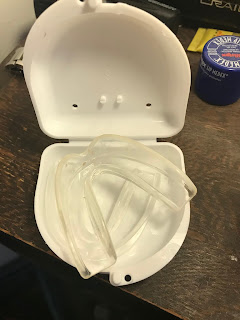Have A Buffer
Last week I wrote about my mouthpiece. Essentially, the gist was that I grind my teeth at night according to what my dental hygienist said evidenced by wear and tear on my teeth. I noted it wasn't the first time I had been told that.
So, I have taken to wearing mouthpiece when sleeping to keep the teeth-on-teeth, like bone-on-bone, friction to a minimum. I restate this because last week I didn't post the link of the blog piece to Facebook and Twitter which is where most of my readers come from. As I wrote last week, that buffer of plastic seems to have reduced my headaches that I was waking up with and not knowing why. I have had headaches for so long that it is just my normal. My hypothesis is that grinding of the teeth was displacing the tension into my jaw muscles, and this somehow was manifesting itself in headaches. The mouthpiece really seems to be helping. I am kicking myself that I didn't institute this intervention sooner. A lot of years of suffering for what.
That has my thinking about buffers in general. It is probably the same idea expressed in that book years ago called Margins. Written by a medical doctor, the author's main point is that we need margin in our lives. How this is related to my thoughts about buffering is this: We need to have protective layer against the concussive nature of life. For example, live below your means so that when that rainy day, week, or months come, your budget has margin and can absorb the loss. Too many people live paycheck to paycheck. I know that for some this is an unavoidable reality. Yet, even people with limited incomes can cut back in places. Like Cable TV. Television is a terrible time-waster and if someone is strapped, they really shouldn't been investing much into it. Drop the smartphone and expensive plan. Together, that already over $200 a month. You'll survive.
In this buffer idea is also the concept of provisions. Someone posted a meme that schools and churches have been shut down but Wal-Mart is open. Which seems like a very effective way of spreading a pandemic. Hundreds of people in a confined space. It makes sense to stock up on non-perishable goods (or goods that can be frozen) so have a dedicated freezer that stores everything and stays closed most of the time unless you are taking something out of long-term to short-term freezer. It will pay for itself and doesn't use much electricity as the door is shut most of the time. Having stockpiles is a good way to ride things like this out, so you can avoid the store.
As I noted last week, I am a macro-shopper essentially because I don't like doing it. It is a lot easier because I am single to do so but if I was married and had a family, I'd still macro-shop and macro-cook. There are a lot of strategies to make the buying and preparation of food macro-like. For instance, have your meat for the week and cook enough for the whole 7 days all at once in the oven. Also make your good carb for the week (whole rice, whole wheat pasta, potatoes) and then cook up dishes with some frozen vegetables. There are a lot of variations possible with spices and sauces. A huge time saver. Cut out anything that is not a whole food.
Another buffer is books. Every house should have a nice library of books to be read.There is no reason to be bored. The Bible of course is a central book for life. The tenor of the books are also important. Are they helpful, uplifting, inspiring, informative, encouraging, etc? We often forget that what we consume in terms of what we read and watch is akin to our diet. Americans are addicted to negative entertainment. Why someone would want to watch murder and mayhem or salaciousness on the TV escapes me. Real life is quite horrifying enough. Make your home a sanctuary from the nonsense of the world by closing the portals. Be careful about social media. If it is leading to agitation and anxiety, put the phone away. Snooze people on social media who seem to enjoy inciting conflict. That is their right but you don't have to be an audience.
The last buffer is both exercise and rest. Our bodies must move, we are not designed to be sedentary, and it helps us relax, cut back on stress, and improve our health in general. Thus, we rest better also. I have really found that a daily routine of exercise to be fundamental. 20-25 minutes is what I can give and I do so six days a week. Get on a non-negotiable schedule and stick to it. The routine gets easier over time. Again, I get frustrated that it took me so long to figure this out. Better late than never I suppose.



Comments